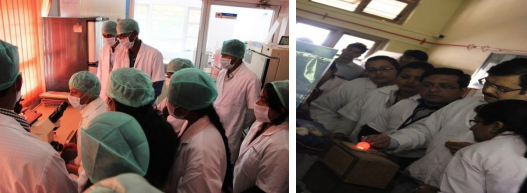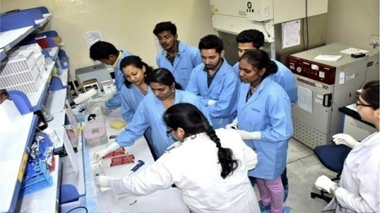Best Practices
“TRAINING TOMORROW'S BIOTECHNOLOGY LEADERS”
The Context:
The department of Pharmaceutical Biotechnology developed 15 days to 2 months handson training programme for the students of Pharmacy/Biomedical/Life Sciences. We offer wide range of program modules in the area of Microbiology, Molecular biology, Cell culture technology, Genetic engineering, Bioinformatics and more to enhance hands on practical knowledge with latest techniques. The Program is designed so as to create advanced level of expertise in Biotechnology domain so that the candidate can answer the demands of the pharmaceutical and life-sciences industry/national laboratories focusing on innovative research.
Objectives:
- To train and make the pharmacy/biomedical/life sciences students towards industrial needs
The Practice:
The department has divided its modules into four different categories – Microbiology, Molecular Biology, Cell Culture Technology and Bioinformatics. All the modules are framed in a manner that comprises lectures from expertise in the field and ten practical sessions where hands-on training is provided to the candidates. We also encourage our departmental Post Graduates students to undergo training programs in national laboratories and industries for more exposure in biotechnology. The PG students undergo training in three categories,
- Diagnostics: Screening using immunodiagnostic method, biochemical testing, and blood reagents preparation
- Bio- therapeutics: Designing recombinant products, blood products and enzymes & hormones
- Vaccines: production of bacterial and viral vaccines.
Students from other Universities undergoing hands on training in cell culture and ex-vivo experiments

The department students undergoing training on “Quality Control Testing of Biologicals” at National Institute of Biologicals, Noida

Obstacles Faced/Problems Encountered:
The challenge faced during the training is inadequate funding, this imparts negatively on reagents and materials available for the use in most of practical sessions. Contamination is another common problem faced that affects our regular day to day work environment but the department has established and standardized a couple of methods and protocols to overcome the problem of contamination.
Evidence of Success:
The candidates who are pursuing or have completed their B. Pharm., M. Pharm., B.Tech, B. Sc., M.Tech, M.Sc., M. Phil and Ph.D in pharmacy/biomedical or any stream of Life Sciences from a recognized University are eligible for the training with us.
- Students from other institutions:
So far in last 3 years 60 students from other reputed institutions have undergone hands-on training in Microbiology, Molecular biology, Cell culture technology, Genetic engineering, Bioinformatics in which they want to become expertise. This training module also contributes independent work nature and the team work which gives the essential supports for lifelong learning and also create opportunity for thinking and analysis on various problems of biotechnology. Based on this training program six students came back to us for the short project of six months on microbial screening, antioxidant activities and cytotoxicity studies.
- Department students under gone training:
Our Post graduate students underwent one month training in the area of standardization of biological and biosimilars at National Institution of Biologicals, Ministry of Health & Family Welfare, Govt. of India and at National Institution of Ocean Technology (NIOT), Chennai for the training on discovery of the potent drugs from marine plants and microbes towards cancer treatment. So far ten students have taken the training at National institution.
As per the feedback of the students on they have learned during the training at NIB, the department has modified couple of methodology on cryopreservation of the cells & in vitro toxicity studies and included a subject entitled “Biological Standardization and Drug Therapy” in PG course. The department is also in process of applying NABL accreditation in accordance with ISO/IEC 17025:2005 in the field of biological testing.